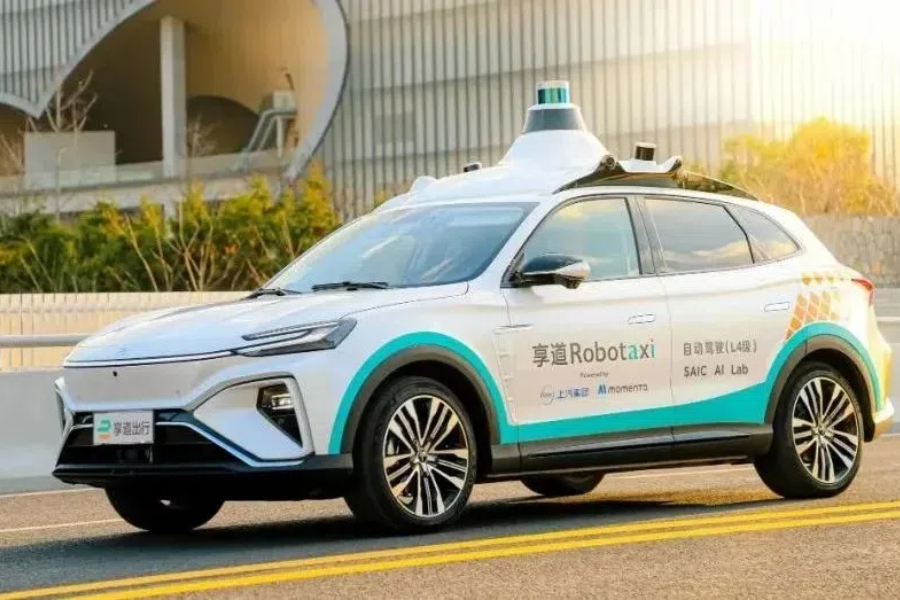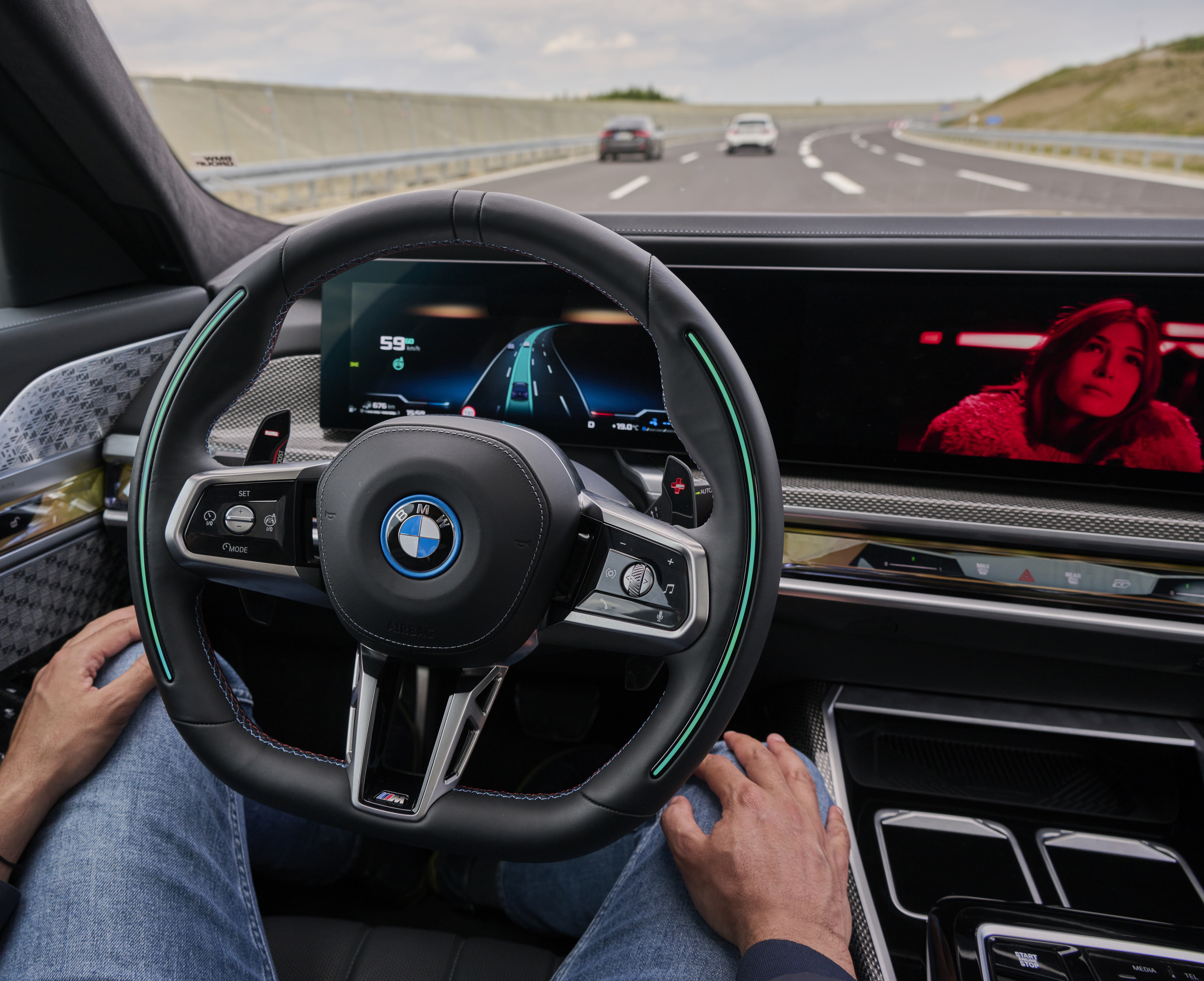
Vueron Newsletter
No. 118
2024.07.16
| SOSLAB gains more than 60% on first day of listing | ||
| Momenta accelerates its drive towards U.S. listing | ||
| Utah pioneers LiDAR-controlled traffic signals with Seoul Robotics | ||
| New Verne robotaxi revealed: self-driving cars could come to UK by 2027 |
1. SOSLAB gains more than 60% on first day of listing
- The stock price of SOSLAB, a company specializing in LiDAR technology, surged on its first day of trading on the KOSDAQ.
- According to the Korea Exchange on the 25th, as of 9:20 AM, SOSLAB’s stock was trading at 18,900 KRW, which is a 64.35% increase from its initial public offering (IPO) price.
- SOSLAB achieved a 1072.3:1 competition rate in its demand forecast targeting domestic and international institutional investors, setting its final IPO price at 11,500 KRW, exceeding the expected range.
- The total raised through the IPO is 23 billion KRW, and the market capitalization after listing is approximately 201.6 billion KRW.
- In the public subscription, SOSLAB also saw success with a 2166.13:1 competition rate, accumulating around 6.2276 trillion KRW in subscription deposits.
- Founded in 2016, SOSLAB is a LiDAR specialist company that applies its LiDAR technology to various fields such as autonomous driving systems, semiconductor transport equipment, autonomous robots, industrial safety, and smart cities.
- Its major clients include global automobile OEMs, IT companies, automotive lighting companies, and domestic semiconductor equipment companies.
- The company has developed the ‘ML’ LiDAR, which overcomes the traditional LiDAR’s weaknesses of price and size by removing the motor and mirror and designing the core components in-house.
- SOSLAB plans to use the funds raised from the IPO for new product development, mass production preparation, and enhancing R&D to proactively respond to market changes.
- By leveraging its advanced technology, the company aims to dominate the autonomous driving LiDAR market.
- SOSLAB is actively collaborating with global mobility companies and numerous big tech companies and plans to focus more on research and development and commercialization following its listing.

SOSLAB’s strong debut on the KOSDAQ, backed by substantial investor interest and a robust strategic plan, positions it well for future growth.
2. Momenta accelerates its drive towards U.S. listing
- Momenta Global Ltd. employs a dual strategy focusing on ADAS and fully autonomous driving solutions.
- The company received approval from the China Securities Regulatory Commission for an IPO on the Nasdaq or New York Stock Exchange, planning to issue up to 63 million shares.
- Momenta joins other autonomous driving firms like Pony.ai and Zongmu seeking offshore IPOs, despite a mixed track record and investor appetite.
- Bloomberg reported that Momenta might aim to raise between $200 million and $300 million.
- Founded in 2016, Momenta initially focused on ADAS for immediate revenue before expanding to fully autonomous driving in 2019.
- Momenta has raised over $1 billion from investors, including Temasek, Yunfeng Capital, Tencent, and Daimler.
- The company’s partnerships with automakers like SAIC, Toyota, and Daimler are central to its “flywheel” strategy, generating revenue and data for future product development.
- Few partners have integrated Momenta’s technology into mass-produced vehicles, with notable adopters being IM Motors and Mercedes-Benz.
- China’s ADAS market grew from 9.3 billion yuan in 2018 to 41.3 billion yuan in 2022, attracting startups and established automakers.
- Momenta launched a robotaxi service, Momenta Go, in Suzhou in 2021, though it’s still in trial phases.
- Regulatory developments in China, such as guidelines for fully autonomous vehicle deployment, could accelerate market adoption but also increase responsibility for companies.

The approval for an overseas IPO and the potential to raise significant funds indicate strong growth prospects and investor interest. However, the mixed performance of peers like Hesai suggests caution and the need for robust financial and strategic planning.
3. Road to autonomous driving: BMW is the first car manufacturer to receive approval for the combination of Level 2 and Level 3.
- BMW is the first carmaker to receive approval for a combination of Level 2 and Level 3 driving assistance systems in the same vehicle.
- The new BMW 7 Series offers both the BMW Highway Assistant (Level 2) and BMW Personal Pilot L3 (Level 3).
- BMW Highway Assistant operates at speeds up to 130 km/h (81 mph) on motorways, allowing hands-free driving for extended periods and includes an Active Lane Change Assistant.
- BMW Personal Pilot L3 allows drivers to take their hands off the wheel and divert attention from the road at speeds up to 60 km/h (37 mph) in specific conditions like traffic jams, enabling in-car activities such as phone calls, reading, and streaming.
- Drivers must be ready to reassume control when prompted.
- The combination of these systems in one vehicle marks a significant advancement in automated driving, providing comfort and relaxation on long and short journeys.
- The BMW Personal Pilot L3 is available exclusively in Germany for €6,000 and includes the Highway Assistant at no extra cost from August 2024.

Offering the Highway Assistant for free to existing customers who purchase the Personal Pilot L3 demonstrates a strategic move to enhance customer loyalty and satisfaction while promoting the adoption of advanced driving technologies.
4. Utah pioneers LiDAR-controlled traffic signals with Seoul Robotics
- Seoul Robotics implemented the first LiDAR-controlled traffic signal system in the U.S. at an intersection in Murray, Utah.
- The project was initiated by the Utah Department of Transportation (UDOT) to improve traffic flow and safety using advanced sensor technology.
- Seoul Robotics’ 3D Perception Engine powers the system, creating a real-time digital twin of the intersection for precise traffic management.
- The collaboration involved Seoul Robotics, Gades Sales Company (local distributor), and Blue Band (software interface).
- The system is non-invasive, mounting on existing infrastructure with a quick two-day installation process for future deployments.
- Operating since March 2024, the system has proven reliable, offering features like stop-bar detection, vehicle detection up to 300 feet, and red light running prevention.
- It boasts a 99.8% vehicle counting accuracy at the stop bar.
- The technology also enhances safety for Vulnerable Road Users (VRUs) by monitoring pedestrians and cyclists, providing data to improve intersection safety and design.

The non-invasive installation process, which integrates seamlessly with existing infrastructure, highlights the system’s scalability and efficiency, making it feasible for widespread adoption.
5. New Verne robotaxi revealed: self-driving cars could come to UK by 2027
- The Verne is a self-driving robotaxi named after Jules Verne, set to be deployed in Zagreb, Croatia in 2026.
- Passengers can summon the robotaxi via an app, eliminating the need for a driver.
Each city with Verne robotaxis will have a “Mothership” hub for cleaning, maintenance, and charging, ensuring minimal downtime. - Verne robotaxis will operate 23.5 hours a day, with only 30 minutes for charging and cleaning, reducing congestion.
- Verne has partnered with Mobileye, utilizing cameras, radar, and lidar sensors for navigation with built-in redundancies.
- The robotaxi includes smell sensors to detect and address unpleasant odors, ensuring cleanliness for each passenger.
- Riders must set up a profile, and onboard cameras document the car’s condition before and after each ride.
- The Verne offers a spacious, steering wheel-free cabin with reclining seats, a 43-inch screen for entertainment, and temperature pre-conditioning via the app.
- The interior materials are durable yet inviting, and sliding doors prevent obstruction of traffic.
- The Verne will launch in the UK in 2027, starting with tests in smaller cities like Birmingham and Manchester.

By offering a luxurious, tech-rich interior and eliminating the need for a driver, the Verne sets itself apart from competitors like Uber, appealing to a more upscale market segment.
*Contents above are the opinion of ChatGPT, not an individual nor company

